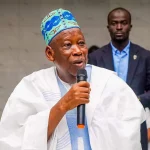Owe Leaders Clarify Role in CNG and EV Project, Dispute Rep Salman’s Claim
The Owe leaders have come forward to set the record straight regarding the recent approval of a Compressed Natural Gas (CNG) conversion centre and an Electric Vehicle (EV) charging station in Kabba, Kogi State.
This was contained in a press statement signed by Chief Adebayo Moses, President Owe Progressive Development (OPD) on behalf of Owe people, stressing that contrary to claims made by Rep. Salman Idris, the Owe leaders assert that he did not facilitate the project.
According to the Owe leaders, the project was made possible through the efforts of an illustrious son of Owe land, who worked tirelessly behind the scenes to secure federal attention for Kabba.
The leaders, including Sir Johnson Jimoh and Uncle Ben Owoleke, confirm that this individual’s strategic engagement and selfless approach were instrumental in bringing the project to fruition.
The statement released by the Owe leaders highlights that Rep. Salman Idris merely paid a courtesy visit to the Director General of the relevant agency, during which he was informed that Kabba had been approved as one of the locations for the project.
Following this, Rep. Idris publicly announced that he had facilitated the project, a claim that the Owe leaders describe as misleading and unfair to those who truly worked to make it happen.
The Owe leaders emphasize the importance of giving credit where it is due and respecting the sacrifices and influence of the individuals who put in the hard work to attract federal attention to Kabba.
They encourage leaders to work for the people, not just for publicity, and express gratitude to those who labour silently for the good of their land without seeking applause.
– “Let it be clearly stated that this project was not born from any legislative lobbying or intervention by the House of Representatives member.”
– “We encourage our leaders to work for the people, not just for publicity.”
The dispute over the facilitation of the CNG and EV project highlights the need for transparency and accountability in public service.
It also underscores the importance of acknowledging and appreciating the efforts of individuals who work behind the scenes to bring development to their communities












